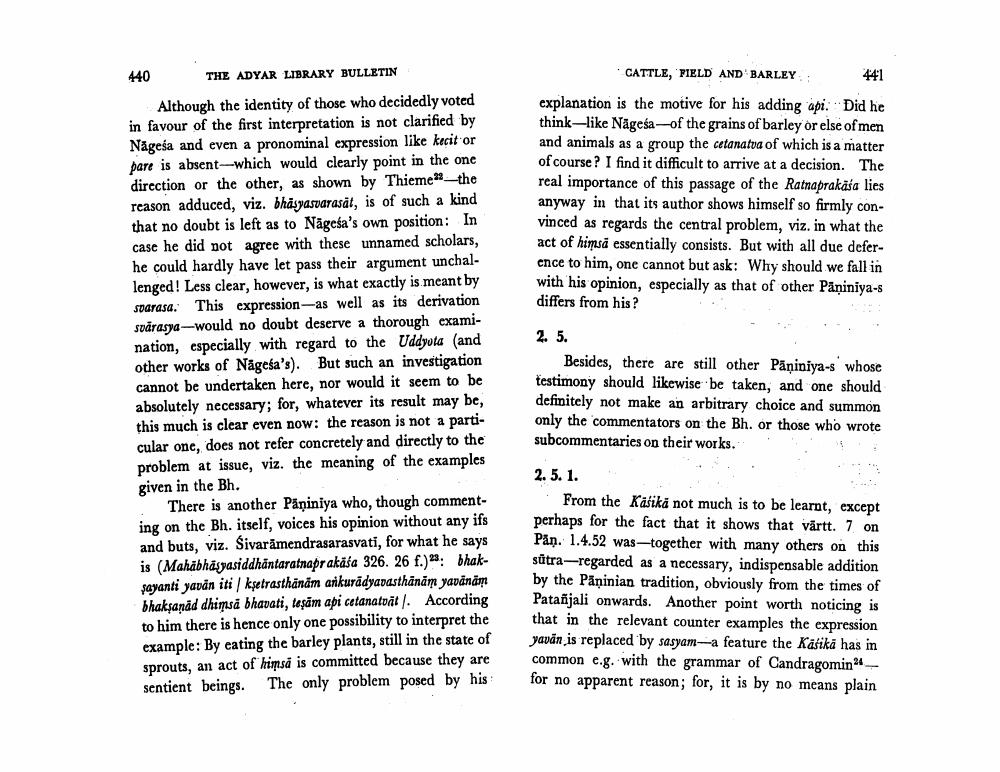Book Title: Cattle Field And Barley Note On Mahabhasya Author(s): A Wezler Publisher: A Wezler View full book textPage 6
________________ 440 THE ADYAR LIBRARY BULLETIN CATTLE, FIELD AND BARLEY 441 explanation is the motive for his adding api. Did he think-like Nägesa--of the grains of barley or else of men and animals as a group the cetanatva of which is a matter of course ? I find it difficult to arrive at a decision. The real importance of this passage of the Ratnaprakäsa lies anyway in that its author shows himself so firmly convinced as regards the central problem, viz. in what the act of himsă essentially consists. But with all due deference to him, one cannot but ask: Why should we fall in with his opinion, especially as that of other Päņiniya-s differs from his ? Although the identity of those who decidedly voted in favour of the first interpretation is not clarified by Någeša and even a pronominal expression like kacit or pare is absent-which would clearly point in the one direction or the other, as shown by Thieme_the reason adduced, viz. bhäsyasvarasät, is of such a kind that no doubt is left as to Nägesa's own position: In case he did not agree with these unnamed scholars, he could hardly have let pass their argument unchallenged! Less clear, however, is what exactly is meant by sparasa. This expression-as well as its derivation svårasya-would no doubt deserve a thorough examination, especially with regard to the Uddyota (and other works of Năgesa's). But such an investigation cannot be undertaken here, nor would it seem to be absolutely necessary; for, whatever its result may be, this much is clear even now: the reason is not a particular one, does not refer concretely and directly to the problem at issue, viz. the meaning of the examples given in the Bh. There is another Pāṇiniya who, though commenting on the Bh. itself, voices his opinion without any ifs and buts, viz. Sivaramendrasarasvati, for what he says is (Mahabhäsyasiddhantaratnaprakäsa 326. 26 f.) 23. bhakşayanti yavan iti / kşetrasthänām arkuradyavasthanam yavänäm bhaksanad dhimsa bhavati, teşām api cetanatvät/. According to him there is hence only one possibility to interpret the example: By eating the barley plants, still in the state of sprouts, an act of himsa is committed because they are sentient beings. The only problem posed by his 2. 5. Besides, there are still other Pāṇiniya-s whose testimony should likewise be taken, and one should definitely not make an arbitrary choice and summon only the commentators on the Bh. or those who wrote subcommentaries on their works. ' ' 2.5.1. From the Kašikā not much is to be learnt, except perhaps for the fact that it shows that värtt. 7 on Pån. 1.4.52 was-together with many others on this sutra--regarded as a necessary, indispensable addition by the Pāņinian tradition, obviously from the times of Patañjali onwards. Another point worth noticing is that in the relevant counter examples the expression yavān is replaced by Sasyam-a feature the Kasika has in common e.g. with the grammar of Candragomino for no apparent reason; for, it is by no means plainPage Navigation
1 ... 4 5 6 7 8 9 10 11 12 13 14 15 16 17 18 19 20 21 22 23 24
